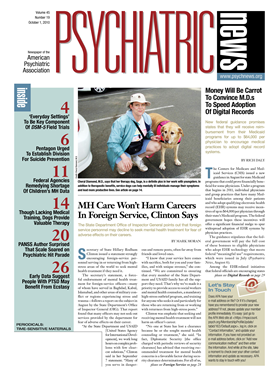Several genomewide association studies have recently linked a variant of a gene on chromosome 12, the CACNA1C gene, with risk for bipolar disorder.
Yet how might this gene variant contribute to bipolar disorder within the brain? German scientists may have found the answer—by impairing the hippocampus, the brain's major memory center.
If this is the case, then it may be the first time that a neural connection between a bipolar disorder risk gene and bipolar illness per se has been identified, the scientists believe.
The lead investigator was Susanne Erk, M.D., Ph.D., of Charite Medical University Berlin. Results appeared in the August Archives of General Psychiatry.
Erk and her colleagues genotyped 110 healthy volunteers. They found that 50 of them carried one or two copies of the CACNA1C risk variant for bipolar disorder; the remaining 60 carried none. They also obtained fMRI images of their subjects' brains while they were performing a memory task.
They found that subjects carrying one or two copies of the CACNA1C risk variant showed a highly significant reduced activation of the hippocampus during a recall task, compared with subjects carrying no copies of the variant.
This finding suggested that the hippocampus might be the neural mechanism through which the CACNA1C variant influences bipolar disorder susceptibility. (Indeed, hippocampal abnormalities had already been observed in bipolar subjects during neuroimaging studies.)
Moreover, subjects with one or two copies of the risk variant scored significantly higher on psychopathology scores for anxiety, depression, interpersonal sensitivity, obsessive-compulsive thoughts, and neuroticism than did subjects with no copies of the risk variant. And the researchers found a link in the carriers of the risk variant between their reduced hippocampal functioning and high psychopathology scores. These findings also led to the hypothesis that the hippocampus was a neural link between the risk variant and bipolar disorder, since an anxious and depressive temperament had already been reported in bipolar patients and their relatives, providing evidence of heritability.
“Thus the observed link between increased scores on psychopathological scales and reduced hippocampal function in healthy risk allele carriers may provide preliminary evidence for subclinical instability and anxiety and depression proneness association with the CACNA1C genotype,” the researchers said.
The CACNA1C gene is known to code for the calcium channel in the membranes of neurons, and calcium channel blockers have shown evidence of efficacy in mood stabilization in bipolar disorder. The scientists hope that their finding of a neural link between the CACNA1C risk variant for bipolar disorder and the illness itself might lead to the identification of new drug targets for bipolar disorder.
The study was funded by the German Ministry for Education and Research and the German Research Foundation.
